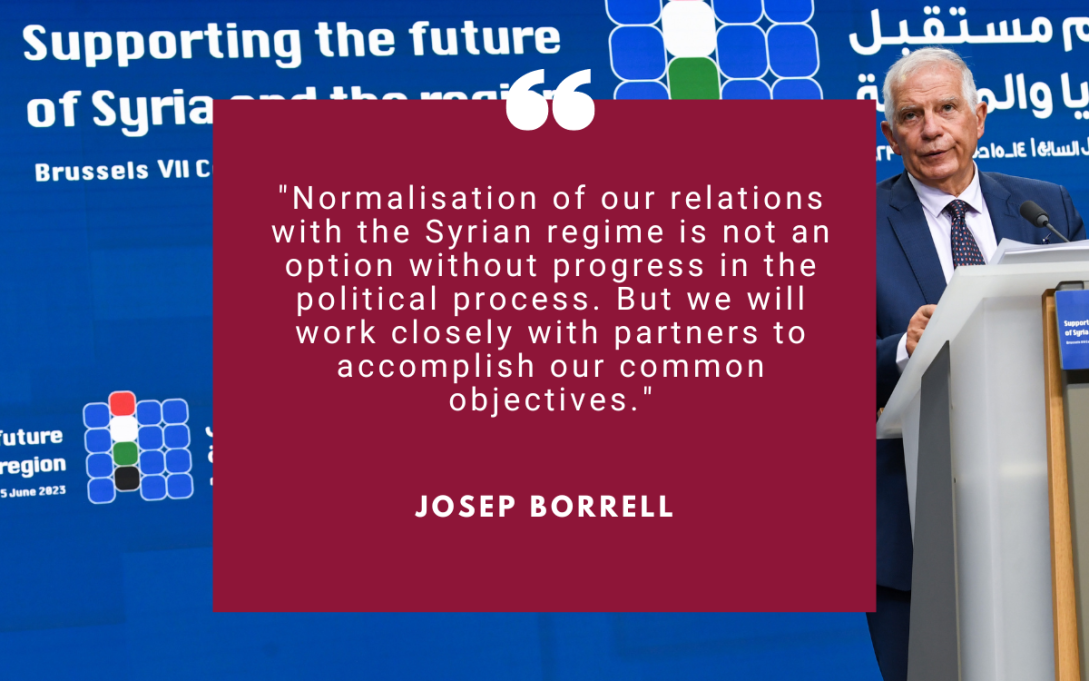The conditions are not met to change the EU’s policy on Syria

While normalisation of relations with the regime in Damascus without meaningful progress in implementing UN Security Council Resolution 2254 is not an option for the EU, we will continue to work closely with our Arab and international partners to accomplish our common objectives. I will have the chance to discuss this weekend in Cairo with the Egyptian and League of Arab States leadership how to work together on Syria.
The humanitarian crisis has reached a new peak
After more than twelve years of conflict, Syria was already confronted with a disastrous situation in the country before the February earthquake. This catastrophe has worsened the country’s humanitarian crisis, which has reached a new peak since the start of the conflict. Already, nine out of 10 Syrians in Syria live in poverty; 60% suffer food insecurity.
While there has been a relative diminution in levels of violence in Syria, repression and conflict are still the daily reality. The Syrian Network for Human Rights puts the death toll for 2022 at 1,057 civilians, including 251 children. And a renewed escalation of hostilities is not off the table. As UN Special Envoy Geir Pedersen reported recently to the UN Security Council, the month of May saw ongoing exchanges of mortar fire across front-lines, the first pro-government-suspected airstrike in Idlib in over five months, and attacks by listed terrorist groups, in addition to airstrikes by regional actors.
One of the biggest displacement crisis in the world
Syria remains also among the biggest displacement crises in the world, with 6.8 million refugees and 6.7 million internally displaced persons inside Syria, half of the pre-war population. An entire generation has been born and brought up in displacement. Some 5.7 million Syrians have taken refuge in neighbouring countries: Turkey, Lebanon, Jordan, Iraq and Egypt, creating an enormous strain on the infrastructure and services of host countries.
“As a result of the Russian military intervention in 2015, the regime now holds about two third of Syrian territory. This has only served to embolden it in stalling progress towards a political solution.”
The Syrian regime and its allies bear the responsibility for a conflict marked by violations of international law and human rights abuses. Because of the Russian military intervention in 2015, the regime now holds about two thirds of Syrian territory. This has only served to embolden the Syrian regime in stalling progress towards a political solution for Syria. The Syrian-led Constitutional Committee has not met in over a year. Before Russia unleashed its invasion of Ukraine, there had been some hope that Moscow would press its client state to make at least token compromises. Since February 2022 however, Russia has been thwarting to any step in that direction.
An ongoing process of normalisation between Arab states and Syria
Nonetheless, the massive earthquake at the beginning of the year accelerated the process of normalisation of relations between Arab states and Syria. It culminated in the readmission of Syria to the League of Arab States in May, and Assad’s subsequent appearance at the League’s Summit in Riyadh. Although I remain sceptical that normalisation will make the Syrian regime more accommodating I share the frustration of Arab partners with the complete lack of progress in the political process. Neighbouring countries are indeed more directly affected by the situation in Syria with the export of drugs, crime and instability at their borders and the lack of prospects for return of refugees.
The Arab leaders I spoke to over the past weeks reassured me that, although our approach may differ, we share the same objectives, namely those formulated in UN Security Council Resolution 2254. I look forward to working with the Amman Contact Group on Syria in order to combine pressure from the EU and likeminded countries with persuasion by Arab States in order to reach our common goals.
“For our part, the conditions for normalisation with the Syrian regime are nowhere close to being met, and the EU and its member states are united on that position.”
For the EU and its member states, the conditions for normalisation with the Syrian regime are nowhere close to being met. We will be ready to assist in the reconstruction of Syria only when a comprehensive and credible political transition is under way, as I underlined last week. The conditions for the repatriation of Syrian refugees, as defined by UNHCR, are currently not fulfilled. We will not support organised returns to Syria unless there are credible guarantees that those returns are voluntary and monitored by the international community. In all my discussions with relevant partners, I have raised the question of forced returns and have been assured that refugees will not be forcibly returned to Syria until these conditions are met.
EU sanctions do not hinder much-needed humanitarian aid
While the Syrian regime has so far not provided any grounds for lifting EU sanctions imposed since 2011, it is important to recall that EU sanctions do not hinder much-needed humanitarian aid. The vast majority of economic sectors, including food, medicine and medical equipment, are not subject to sanctions. Last February, the Council modified the Syria sanctions framework to further facilitate the delivery of humanitarian assistance.
We have witnessed how essential such swift aid delivery is in the wake of the devastating February earthquake in Syria and Turkey. For millions of people living in the most affected areas it is a matter of life and death. The EU works with Turkey and other likeminded partners to achieve the renewal of the vital cross-border UN resolution guaranteeing the delivery of humanitarian assistance into Syria.
“The EU will work with Turkey and other likeminded partners to achieve the renewal of the vital cross-border UN resolution guaranteeing the delivery of humanitarian assistance into Syria.”
In this dire environment, signs of hope must however not be dismissed. We will continue to support Syrian civil society and encourage them, paying special attention to the crucial role played by Syrian women.
We have to support Syrians living in Syria, who want to rebuild their country – despite the depredations and abuses of the Assad regime - along renewed, democratic and peaceful lines.
We have to support host communities in the region for their continued hospitality. Even as needs rise and tensions mount, these societies have been providing generously for nearly six million Syrian refugees. This is certainly a heavy burden. The Jordanian Minister of Foreign Affairs Safadi explained to me that, in Jordan alone, more than 200,000 children were born by Syrian refugees since the beginning of the conflict. While supporting host countries, we also need to resist scapegoating of refugees for political ends and seek to defuse tensions between refugee and host communities.
€ 9.6 billion pledged for Syrians in Syria and refugees and host communities
The international community has to continue supporting both Syrians in Syria and refugees and their host communities. At last week’s Brussels Conference on the Future of Syria, donors pledged a total of € 9.6 billion in grants and loans, 800 million more than in 2022. The EU and its Member States represent 70% of the grants pledged.
Finally, we must continue to support UN Special Envoy Geir Pedersen in his efforts to generate momentum for a renewed political process. At the Syria Conference, he concluded that we could be at an ‘inflection point’, a new chance to move forward. Let us do what we can to give him the backing he needs to seize this opportunity.
MORE FROM THE BLOG

“A Window on the World” – by HR/VP Josep Borrell
Blog by Josep Borrell on his activities and European foreign policy. You can also find here interviews, op-eds, selected speeches and videos.
